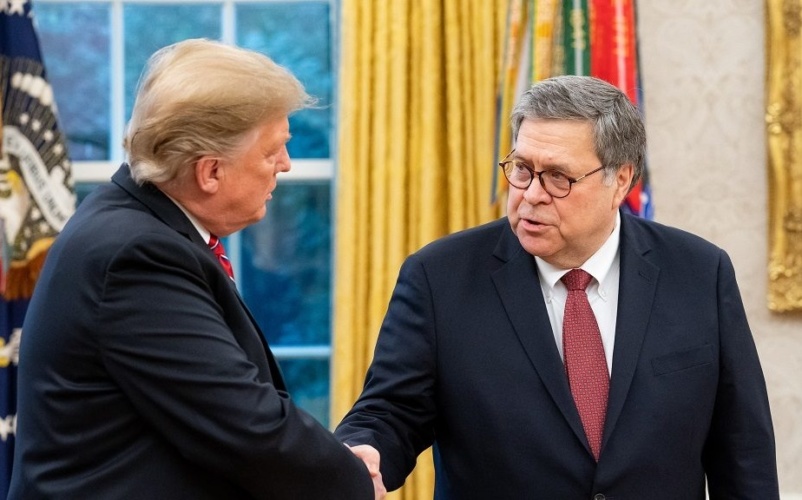Attorney General William Barr with Donald Trump (Tia Dufour/White House)
The head of the House Intelligence Committee says legislators have “very little visibility” into a Justice Department inquiry, ordered by Donald Trump, into US intelligence agencies.
Pushing back against the Trump-Russia investigations as a “witch hunt” and “hoax”, Trump demanded an examination of the investigators. His Attorney General William Barr, appointed in February, complied after providing cover for Trump over the Mueller Report, released in April.
Rep. Adam Schiff said on Wednesday, “It’s an effort to amplify the counter-narrative, and to ignore what the Russians did, and what they will do in the next election.”
He expressed concern that “we’ve already seen a disturbing erosion of our checks and balances” over the White House’s contacts with the Justice Department.
John Durham, the US attorney for the District of Connecticut tapped by Barr, has reportedly been concentrating on CIA analysts who concluded that Russian President Vladimir Putin interfered in the 2016 election to help Trump win.
Concern has been elevated by Trump’s decision to give Barr sweeping declassification authority, a power usually delegated to intelligence leaders over their own material.
“I have discussed personally with the Director of National Intelligence [Dan] Coats my profound concern about what Bill Barr is doing in particular,” Schiff said. “Namely, his desire to provide cover to the president by investigating the investigators.”
Pressure on Investigators
Just before becoming President, Trump attacked US intelligence agencies, comparing them to “Nazis” amid the publication of the Steele Dossier, a collection of memoranda linking Trump and his campaign staff to Russian officials.
Throughout the investigation of the agencies and then from May 2017 of Special Counsel Robert Mueller, Trump and his allies assailed former and current officials of the FBI and the CIA, as well as Special Counsel Robert Mueller and his team. Among the allegations is the claim that conversations in Trump Tower were wiretapped, including by microwave ovens.
The FBI has been derided for obtaining a warrant in October 2016 from a top-secret Government court to surveil Trump campaign advisor Carter Page.
The FBI had monitored Page since 2013, after Russian operatives tried to recruit him as an agent. In July 2016, self-styled oil executive Page, while working for the campaign, travelled to Moscow and met Russian officials.
The FBI’s warrant was supported by evidence from multiple sources, and complemented by US intelligence services’ examination of Russian hacking of computers linked to the campaign of Democratic nominee Hillary Clinton. The warrant, from the Foreign Intelligence Surveillance Court, was renewed throughout 2017 and early 2018 by Deputy Attorney General Rod Rosenstein.
But for two years, Trump and his supporters have pushed the false narrative that the FBI inquiry was based solely upon the Steele Dossier, 17 memoranda with raw intelligence about contacts between Trump, his campaign staff, and Russian actors since 2013.
The dossier was compiled by former British intelligence officer Christopher Steele, working for the private firm Fusion GPS. It was initially commissioned by Repubican opponents of Trump, and then by the Democratic National Committee.

